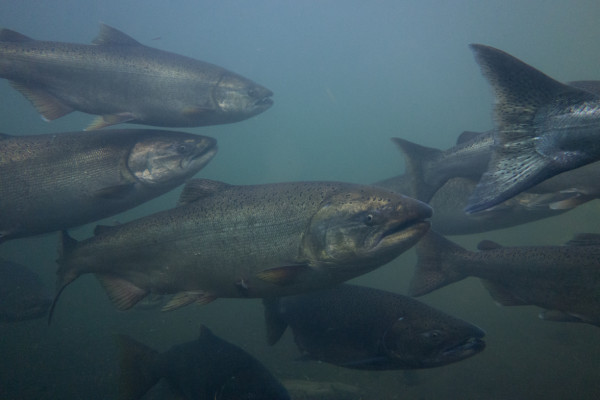Vision for Clackamas Wild Spring Chinook Salmon & Fisheries
We envision a Clackamas River that supports a naturally regenerating run of Spring Chinook Salmon capable of sustaining itself, the ecosystem, and the consumptive relationship that’s foundational to the values of Tribal Nations and local community members. To achieve this goal we’re focused on actions that remove existing barriers to recovery and concentrate resources toward solving the root causes of wild fish declines.
Wild Spring Chinook Salmon Decline in the Clackamas
In the Clackamas River, Spring Chinook Salmon declined from 27,000 to just more than 2,000 fish. This massive decline is due to the loss and degradation of habitat from dams and development, hatchery impacts to wild fish health, and unsustainable fisheries. In 1999, the Clackamas Spring Chinook were protected as a threatened species under the Endangered Species Act as part of the Upper Willamette Spring Chinook Evolutionarily Significant Unit (ESU). Prior to colonization, this entire population numbered 300,000 adult wild fish, and has declined to less than 10,000 wild fish today. The Clackamas wild Spring Chinook Salmon are one of only two remaining populations left in the entire Willamette watershed.
A Hatchery Program in Decline
Hatchery releases of Chinook Salmon started in the Clackamas River in 1939 to supplement fisheries in the Willamette and Columbia. The more recent Spring Chinook Hatchery was founded in the 1970s to provide additional fish for sport and commercial harvest due to habitat loss from dams. This hatchery program is authorized to release up to 1,000,000 juvenile fish annually and as recently as 2014 released 750,000 juvenile hatchery Spring Chinook Salmon. Of this ¾ of a million hatchery fish, just 230 returned as adults, of which only 10 were caught in the Clackamas by anglers last year. After 50 years, the hatchery Spring Chinook Salmon program can no longer support itself or provide anglers with fish to catch.
Ask NOAA Fisheries To Prioritize Wild Recovery & Fisheries
As a result of the poor hatchery return, ODFW is now seeking permission from federal agencies to remove threatened wild Spring Chinook Salmon from the Clackamas River so they can be utilized as broodstock in the hatchery with the hope of improving the hatchery return.
Take Action
We’re asking federal agencies to postpone granting this permit until they can make a decision based on data from their forthcoming 5-year status review of Upper Willamette Spring Chinook Salmon, a rigorous review of ODFW’s study design and funding plan, an agreement to stop the collection of wild broodstock after 3 years, and the recommendation to explore alternative, wild fishery opportunities if the recovery is strong. Please join us in urging federal agencies to focus on the recovery of Wild Spring Chinook Salmon and the development of wild opportunities.

